The horsemeat scandal could see tens of thousands of pupils reject school dinners in favour of unhealthy packed lunches, a leading child nutritionist has warned.
Dr Charlotte Evans of Leeds University said the detection of horse DNA in several meat products could put parents off canteen dinners and trigger a rise of up to 10% in the numbers bringing in a packed lunch – just 1% of which meet basic nutritional standards.
Until a few weeks ago, Nickie Young would send her 15-year-old son, Ethan, off to school with £2.50 in his pocket for a hot lunch.
But after reports of horsemeat being found in some ready meals and food provided by school caterers, Young, a single mother on a low income, now gives Ethan a packed lunch most days.
Typically, he will have a couple of slices of processed ham in white bread, crisps, an apple and a cereal bar, or the remains of last night's dinner.
"I've changed the way we eat as a family," says Young, a teaching assistant from Suffolk. "I'm less trusting.
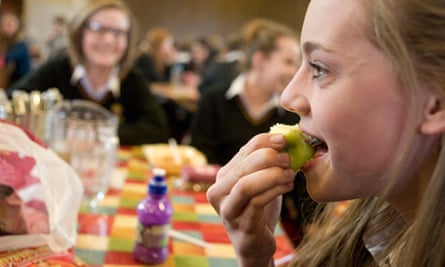
"We don't eat ready-made meals that contain meat now and Ethan takes packed lunches most of the time. You just don't know what contains horse and what doesn't."
The headteacher of Ethan's school, King Edward VI in Bury St Edmunds, has been quick to reassure parents that the canteen is horse-free. In fact, its meat is sourced from a local butcher.
The school is in many ways an exemplar of how to encourage children to eat well. The dining hall is called Le Bistro, students eat from china plates and the chef uses extra virgin olive oil, seasonal produce and fair trade fruit and vegetables to create a selection of nutritious, filling meals every day. Chips appear on the menu only once a week and processed Turkey-Twizzler-type foods are nowhere to be found.
But despite this, just half of pupils at the comprehensive opt for a school dinner. The others bring in packed lunches – nearly always a less healthy option.
It's quarter to one at Le Bistro and Millie Pettitt is finishing off a wrap containing processed ham and cheese. The 14-year-old also has crisps, and a packet of Iced Gems for afters. She admits her lunch is probably less nutritious than the cottage pie on the school menu today, but doesn't mind.

Her friend Beth Hales, also 14, ate most of her packed lunch during the 11am break – a chicken sandwich, an orange and a packet of bacon crisps.
Mark Wreford, 15, has pasta and pesto made fresh that morning, but also has a packet of Jaffa Cakes, crisps and a chocolate bar in his lunchbox. "It's probably as healthy as the school dinner," he says.
Wynn Rees, the school's deputy headteacher, says he does see pasta and fruit in lunchboxes, but acknowledges that "the pattern of sandwich, crisps and a chocolate bar is quite common".
Experts say the standard of school dinners in England has never been so good, but the proportion of children taking – mostly unhealthy – packed lunches remains stubbornly high.
Researchers at the Children's Food Trust found 54% of English primary school pupils and 60% of secondary students took a packed lunch in 2011-12 – a drop of only 2.2 percentage points on the previous year.
Packed lunches are often high in fat, salt and sugar and are much more unhealthy than school dinners, the trust warns. A survey it conducted recently suggests that young people are increasingly putting leftovers, such as cold chips and rice, into their lunchboxes.
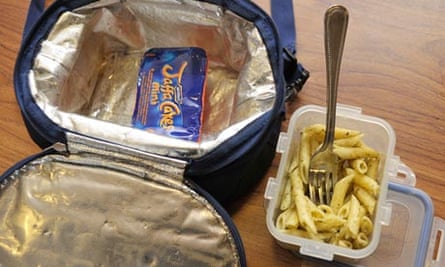
Just 1% of packed lunches meet basic dietary standards, a study by Leeds University found in 2010.
Evans, who was involved in that study, now fears that the horsemeat scandal could fuel a rise of as much as 10% in the number of children taking packed lunches to school.
"I think, unfortunately, it is likely that we will see more parents give their children packed lunches," she says. "Parents care so much about what their children eat – they care more deeply about this than about what they themselves eat. All the work I have done has shown that school meals are of higher nutritional quality than packed lunches. Packed lunches are usually higher in sugar and saturated fat."
The Children's Food Trust says parents are confused about what constitutes healthy eating.
A report last year by the trust said: "The predominance of high fat, sugary and salty foods in convenience shops, on supermarket shelves and in fast-food outlets means that making healthier choices requires a level of commitment and a knowledge of nutrition that is beyond many."
The horsemeat crisis has affected schools across the country. Sodexo, a supplier of meat products to schools and the armed forces, withdrew all of its frozen beef products from its UK operation last month after some of it tested positive for horse DNA. Schools in Scotland and Wales have been told not to serve certain burgers, while schools in Lancashire have been warned not to offer up cottage pies.
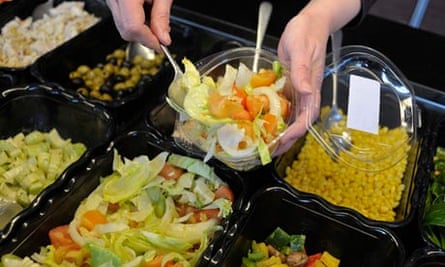
"The horsemeat scandal has put me off school dinners even more than before," posted Grace Hall on Facebook's Netmums page in response to a Guardian inquiry about whether parents were switching to packed lunches.
Joanne Jones wrote: "My son has school meals except once a week … but I've started making more vegetarian choices so that he stays away from red meat."
Evans added: "The worry is that all the work done to improve the takeup of school dinners could be undone by the horsemeat scandal." But Ashley Adamson, a professor of public health nutrition at Newcastle University who is on the expert panel of the government-commissioned review into school meals, said that while there had been a couple of calls from parents inquiring about the origin of meat used in school canteens, there had not been a noticeable switch to packed lunches. The Local Authority Caterers Association had not reported any recent fall in the uptake of school meals, she said.
Henry Dimbleby, who is leading the inquiry into school food and is one of the founders of the Leon chain of restaurants, urged parents to complain to headteachers if they thought canteen dinners were not up to scratch.
"We would encourage parents who give their child a packed lunch to go to the school and try the food – it is likely that they will be surprised by the quality. If they don't like what they see, they should talk to the headteacher about it: parental pressure has been one of the things that has helped turn around the service in recent years.
"The reality of what is served in schools is far, far better than the perception of many parents, who often remember what it was like in their day. Food served in schools has improved enormously over the last 10 years and a school dinner is significantly better for a child than almost all packed lunches."
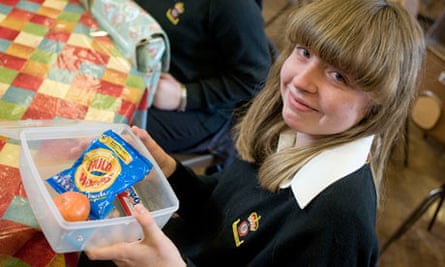
England's schools have got better at serving healthy food since 2005, when celebrity chef Jamie Oliver drew attention to the abysmal state of canteen dinners. The proportion of teenagers having chips at lunchtime dropped from 43% to just 7% between 2004 and 2011, while the number of schools offering pizza every day fell from 66% to 50%.
At some schools, such as Lauriston primary in Hackney, north-east London, fruit and vegetables are grown in the school's garden.
Apart from horsemeat scares, most parents who reject a school dinner for their child do so because of a perception that a cooked lunch costs more than a packed one.
Evans says they cost roughly the same – about £2 for a one- or two-course meal. "It's because we tend to pay for school meals each day, rather than as part of our weekly shop, that it seems more expensive," she says.
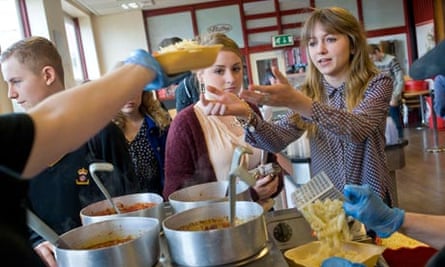
She argues that the government should consider subsidising dinners, but admits that even when cooked dinners are made totally free, as was tried in some parts of Scotland, 15% still take packed lunches.
One option is to ban packed lunches and high-fat, sugary foods altogether. But teachers aren't keen on this idea. "Coercion is the wrong approach," says Rees, of King Edward VI school.
"Pupils are taught about healthy eating in lessons. We don't need to pitch in like the food police. It will lead to disaffection."
Under the Labour government, primary and secondary schools were made to adhere to food standards that some felt were excessive – oily fish had to be on the menu, for example.
The current government has gone the other way and relaxed the rules so much that Ofsted no longer inspects school dinners and academies do not have to obey the food standards at all.
The Children's Food Trust says it is concerned that improvements to school dinners will slip back, but schools such as King Edward VI are adamant that they won't let this happen.
"Although academic achievement is our number one core business," Rees says, "we know that healthy food makes for an enhanced attitude to learning."
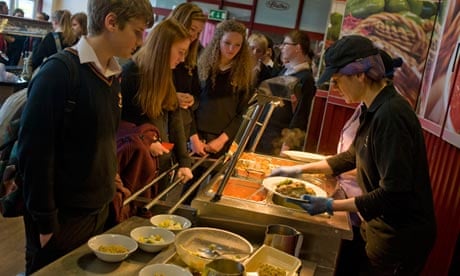
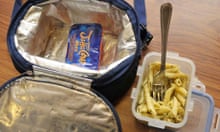
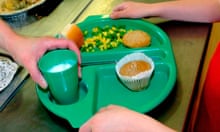
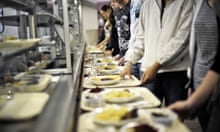
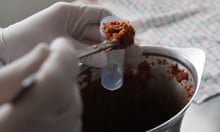
Comments (…)
Sign in or create your Guardian account to join the discussion